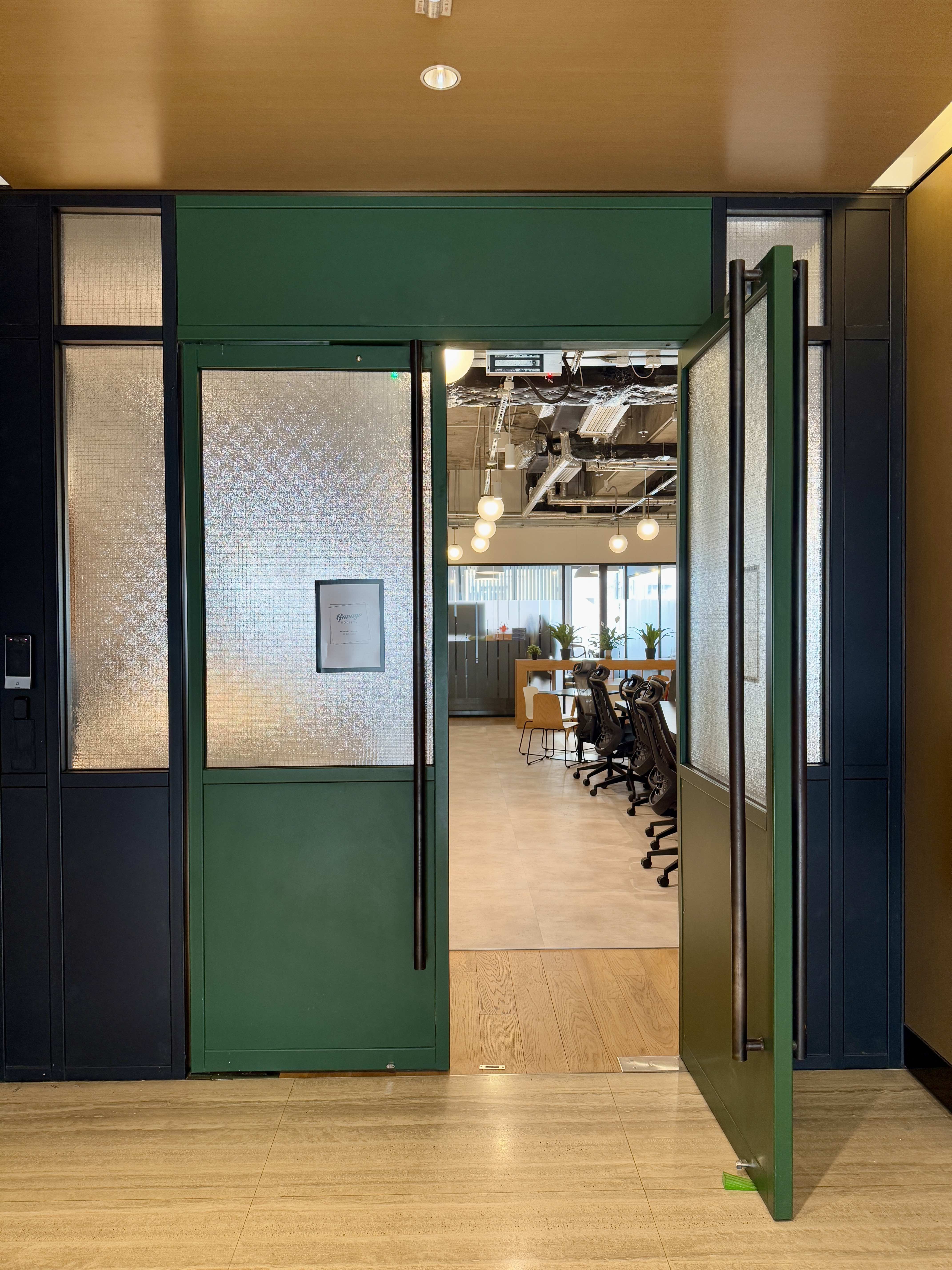LOCATIONS
Hong Kong
-
Facebook
-
LinkedIn
-
Instagram
-
Youtube
Author: Ching Lam Ip, Programme & Marketing Lead, Garage Society
As part of our #BeTheChange series, we sit down and discuss how people and businesses have evolved, with change-makers in our Garage Community.
This week, we sit down with Rick Chen, co-founder of Hush Home, a Hong Kong based company for all things sleep-related. We met him at Garage Society Sheung Wan, as he shared the story of how Hush Home came to be, why it’s important for the company to advocate social change, and what it means to be a leader.
Rick Chen: Yes! The first time we moved into Garage Sheung Wan last year, we had an unusual setup, but your team was very accomodating and we enjoyed the time immensely.
As our company grew, there came a stage where we needed a more permanent space. So we moved away to a larger space that could serve as half office, half showroom.
A major reason for this decision was so we could experiment with a brick-and-mortar retail experience, play around with branding, product display and customer flow. We’re still going through that learning process now!
Recently, our team and business have grown quite a bit, and so we needed more office space again! We’ve always had a great experience at Garage, and so that was really the only coworking space we considered.
Rick: We implemented something new to our customer journey, in response to the pandemic.
Since COVID started, we’ve allowed our customers to book private appointments at the showroom, giving them 20 - 30 minutes to test all products and speak with our sleep consultants. It provides a very hygienic experience for our customers, and I think it’s been quite successful!
Rick: I started this company with Stephanie, my wife and business partner.
When we moved in together, we were focused on getting better sleep to hit our health goals. We went mattress shopping and were shocked to learn that Hong Kong has some of the highest mattress prices in the world. We did multiple days of shopping and purchased a relatively expensive mattress.
When the mattress finally arrives, we’re super excited. But after the first night, I wake up feeling tired and groggy with a sore back! I’m hiding this fact from Stephanie, since I’m trying to justify this purchase decision and secretly hoping that she really loved this mattress.
So I ask her how she slept, and she answers bluntly, “I think we can make a better mattress and sell it at a more affordable price”.
Rick: Stephanie’s a certified health and wellness consultant. This is especially important for her as she’s from Hong Kong, and the culture in this city tends to de-emphasize the importance of sleep.
It’s seen as a weakness to sleep a full eight hours, and you might get questions like “Why aren’t you more productive?, “Shouldn’t you go to the gym in the morning?”, “Why aren’t you working on something?”.
Stephanie wanted to change that mindset, and so she designed a seminar that curates the latest sleep science into a one-hour course for big organizations. Fortune 500 companies such as Citibank, or MetLife or Standard Chartered invited us into the office (before COVID, of course) to educate their colleagues on how to supercharge their sleep to improve their performance.
The workshops were hugely successful, but generated zero revenue for our company. We wanted to inspire Hong Kongers to sleep better so they can be better versions of themselves.

Related Articles
Rick: We try to design the Hush Home experience through the eyes of the customer. We understand that there is often a huge information asymmetry between sellers and customers, because realistically, you’re only shopping for a mattress every 10 years or so. Most people have only done it before once or twice in their lives, and so they won’t actually know that much.
Some sellers in the traditional retail environment take advantage of this, and make it purposefully difficult for consumers to price compare or feature compare. For example, say that a retailer has ten products. It’s actually fairly common for these ten items to be sold under one set of product names in their direct store, but under a different set of names at a department store.
When we saw this, we thought, “this is completely confusing for consumers!”, and strived to create an experience that made it as easy as possible. That's why two years ago, we created a digital content library of objective information online for Hong Kong shoppers, specifically so they can make an informed decision. We really try to be as objective as possible, and not brand-specific.
We hope that these resources help consumers navigate their purchasing journey!
Rick: We hope that more companies in Hong Kong can look for ways to make a positive contribution to the local community. Even as we were building this business, it was super important for us to make sure that social impact is part of the fabric that made up our company.
Early on in our history, we worked with an awesome non-profit called Crossroads Foundation. We set up a joint charity drive, centred around helping local families with their spring cleaning over Chinese New Year.
We also volunteered to pick up any donations of home goods from our customers and deliver them to low-income families. Since most people don’t drive in this city, the logistics of donating larger items can actually get very costly.
Six months after that campaign, Crossroads told us, “Your campaign was super successful, and it set a very high benchmark for volunteer initiatives”! Apparently, two giant, multinational companies were inspired by the success of the campaign and approached Crossroads to do something similar, which seems insane to me! At the time, our company was only 1.5 years old, so I was extremely proud of our team for that.
Rick: Our values have definitely evolved. Part of that coincides with my personal growth as a co-founder, and part of it with business growth.
In the beginning, my role was as a creator: create new mattress designs, create an end-to-end supply chain, create a brand, a website, marketing campaign - you name it.
After that, my role was to be a builder: build out a product road map, build a long-term marketing strategy, build a content library. Most importantly, we were building a team of very talented people.
Now, we’re at the stage where I need to be a leader. And to me, that means instilling a set of values that will give the company a long-lasting, durable advantage.
One of those values is social impact, as we mentioned before. Another would be to never, ever underestimate what you can do in the long term. A lot of people tend to overestimate what they can achieve in the short term, but underestimate their potential in the future. We believe that you can achieve so much by making minor, incremental improvements every day, over a long period of time.
We have a few other values, but at the end of the day, they’re all tied around finding purpose in your work, and doing the best job that you can do.
Rick: It can be hard, actually. The change in approaches is kind of like the hierarchy of needs analogy - In the beginning, it’s straightforward because you’re always prioritising sales. The default position for any company, but especially a young company, is death. And so we are just hyperfocused on survival. We were on a shoestring budget, and all of that went into inventory. We didn’t pay ourselves.
As we started to build the company, we realized that the values necessary to build are different from the values necessary to launch. The values that you need at launch, while necessary for your company’s survival, may become short-sighted as your company scales.
One of my biggest learnings in the past year, as our company has matured, is that I need to let go of some of those traits that helped us launch the brand 4 years ago. That they’re actually standing in the way of us being successful in 5 years.
I’m still in the middle of that learning process. It can be quite challenging because it requires me to reevaluate my beliefs, and be very self-aware.
Rick: Yes, I believe that you should always be looking to learn and improve. That includes drawing a lot of ideas from outside of work, to help reshape and reframe what we’re doing in the company. This could be talking to someone in a different industry, really looking at a new ad on the bus, or even just studying the design choices made in the restaurant I'm sitting in.
I also find a lot of inspiration through videos, podcasts and other content that exposes me to different points of view. I’ve actually signed up our whole company for Masterclass!
I used to believe that someone out there must have the right answer to all these questions we had about running our business. That for any decision or problem we faced, there exists a general rule of thumb, or standard answer for a company like ours.
Recently I’ve realized that, in fact, nobody knows the right answer. All of us business leaders make imperfect decisions with imperfect information - and that can be either very horrifying or very comforting.
Each business has its own path. While you may learn from others in what direction to point, there is no map for your specific company to tell you left or right. You have to learn the lessons the hard way, by making a few mistakes yourself, and eventually, you will stumble closer to the right answer.
With that in mind, the best that I can do as a business leader is to take off my blinders, look up from the framework of my company every so often, and try to learn as much as possible from leaders in different industries.
It can be psychologically difficult to change your way of thinking, but as a leader, you need to get better. The company deserves a better leader.

When Rick isn’t perfecting his showroom space, you can find him at Garage Sheung Wan taking in city-wide views from the 25th floor, and chatting with other entrepreneurs in the community.
To learn more about Hush Home, you can check out their website, and follow them on social media!
Note: This interview has been edited for length and clarity.
 Garage Blog
Introducing Garage Society's Newest Premium Workspace at Tower 535 Causeway Bay
Garage Blog
Introducing Garage Society's Newest Premium Workspace at Tower 535 Causeway Bay
We're thrilled to announce the opening of our newest Garage Society location in the heart of Hong Kong's most dynamic business district!
Garage Society Causeway Bay brings our signature blend of community, innovation, and premium workspace to Causeway Bay's prestigious commercial hub.
 Garage Blog
From Flat White to Flexspace - The Best Coffee Spots Near Garage Society Locations
Garage Blog
From Flat White to Flexspace - The Best Coffee Spots Near Garage Society Locations
Looking for the perfect cup of coffee to fuel your workday?
Members enjoy free coffee 24/7 in our spaces, but sometimes they need a change of scenery (or bean!). That's why we've compiled this guide to our members favourite independent coffee shops near each Garage Society location!
Whether you're a dedicated hot desk member or just exploring flexible workspace options, stay caffeinated and inspired with our picks below: